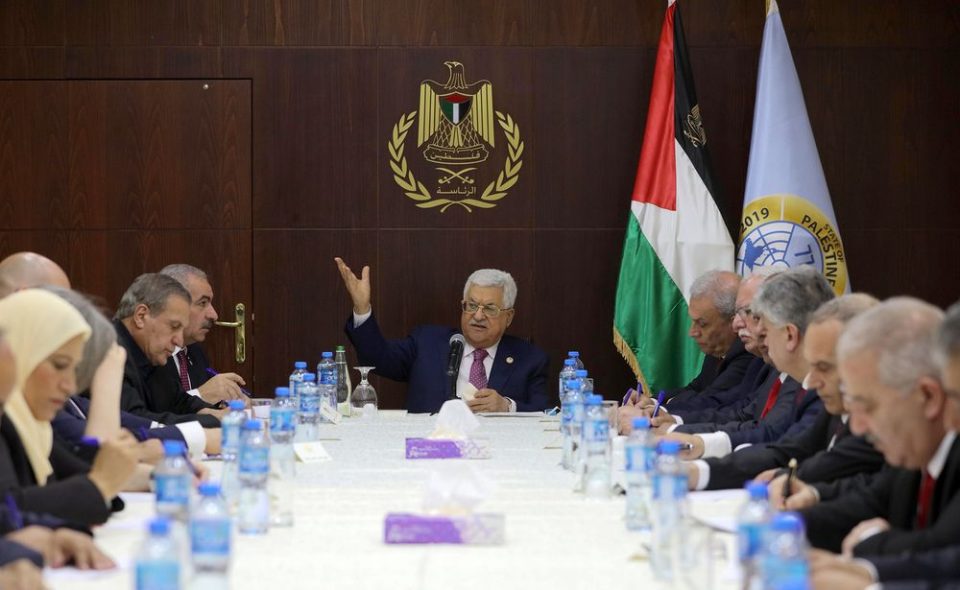Former Saudi Ambassador to the United States Bandar Bin Sultan called for a new Palestinian leadership in the first two parts of an interview whose final portion has yet to air.
Oct 9, 2020
A three-part exclusive television interview with the former Saudi ambassador to the United States, Bandar Bin Sultan, has produced mixed reactions among Palestinians.
Two parts of the series have been broadcast by Al Arabiya. In them, Bin Sultan focuses on missed Palestinian opportunities for making peace. He says that the Palestinian cause, while just, has bad lawyers representing it. He has publicly called for a change in the Palestinian leadership.
Palestinian President Mahmoud Abbas has instructed all senior officials and government-controlled media outlets not to engage with the Saudi official. Foreign Minister Riyad Malki sent a memo to all Palestinian embassy staff around the world with a similar message of restraint and orders not to comment on the Saudi official’s statements.
Secretary of the PLO Executive Committee Saeb Erekat did not follow the instructions and tweeted Oct. 8 that efforts to change the Palestinian leadership are nothing new.
“We call on all Palestinians not to say anything against the symbols of Arab countries, but whoever wants to present their credentials to Washington or normalize with Israel can do so without defaming the Palestinian people and their national struggle. They can say their interests require them to normalize with Israel.”
——————————————————————————————————————————————————————-
Advertisement

———————————————————————————————————————————————————————
Hassan Asfour, a Palestinian leader from Gaza living in Egypt, publishes the Amad news site, which is generally critical of the Palestinian leadership. He defended Abbas in an editorial, writing, “After all that President Abbas has shown in absolute flexibility and has been attacked for it, Prince Bandar has now sent a message without any ambiguity in it calling for alternative Palestinian leadership.”
Asfour, who is said to be close to renegade Fatah leader Mohammad Dahlan, wrote in an editorial that Bin Sultan’s messages are full of distortions and half-truths and mark a major departure from traditional Saudi policy.
“The Saudi prince went against all Arab traditions when he declared that there will be no more cooperation with or support to the Palestinian people as long as the current leadership is in power. His words are outside the accepted norm,” he wrote.
Nabil Amr, a Fatah leader who apparently has high ambitions for the upcoming elections, wrote for the Natour Center that the negative comments are designed to lay the groundwork for the Saudis to join the United Arab Emirates and Bahrain in normalizing relations with Israel.
Oraib Rantawi, the director of Al Quds Center for Political Studies, argued in his daily column for Ad-Dustour that some Arab leaders are buying the Israeli propaganda and adopting it to accuse the Palestinian leadership of responsibility for their own plight.
Nasser Laham, editor of the independent pro-PLO Maan news agency, called the Saudi move unusual in an editorial. “Traditionally, Saudis have taken to quiet diplomacy. This is the first time they’ve made critical attacks and exposed issues. This will open an unprecedented gate because the Saudis have many secrets involving their positions in Lebanon, Syria, Qatar and other countries.”
Hamas spokesman Sami Abu Zuhri tweeted, “Attacking the Palestinian leadership and defending the agreements with Israel are sad and they only serve the occupiers.”
Much of the commentary against Palestinians seems to stem from their strong and uncompromising position against the United Arab Emirates and Bahrain for their decision to normalize relations with Israel.
A senior Palestinian official told Al-Monitor on condition of anonymity that the anti-Palestinian mutterings are the behind-the-scenes work of Jared Kushner, the son-in-law and senior adviser to US President Donald Trump. The source emphasized that the Americans pushed hard to get the Saudis on board the normalization train but because of the strong Palestinian response, the Saudis refused, offering Bahrain as a consolation prize to the Trump administration.
The uncompromising position of the Palestinian leadership seems to have hindered the Saudi-Trump relationship and ruined Trump’s chances of achieving a major international success before the election.
Over the last month, the United States has been entirely focused on the election and domestic issues such as COVID-19, race and the nation’s economy. Even the highly publicized signing event with the UAE, Bahrain and Israel made few waves. The US news media is totally absorbed with the pandemic.
Nevertheless, Palestinians understand that there is an internal struggle in Saudi Arabia. The attacks on the Palestinian leadership clearly betray the existence of an anti-Palestinian stream. The Palestinian reaction has been to bide time until the US elections take place and allow for Palestinian elections to legitimize the Palestinian position. The push for a change of leadership is meant to weaken the Palestinian leadership.
Statements, comments or opinions published in this column are of those of the author(s) and do not necessarily reflect the editorial policy of Warsan magazine. Warsan reserves the right to moderate, publish or delete a post without prior consultation with the author(s). To publish your article or your advertisement contact our editorial team at: warsan54@gmail.com


